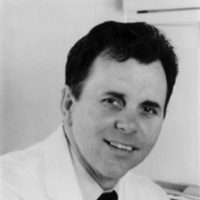
Barry Marshall
University of Virginia Medical Center
For the discovery that Helicobacter pylori causes peptic ulcer disease.
Rarely do the discoveries of a single individual change the lives of countless millions within the span of a decade. The revolutionary research of Barry J. Marshall into the causes and treatment of peptic ulcer disease has accomplished just that, and in so doing he has dispelled the darkness surrounding a painful chronic disease, and lighted the pathway to a cure.
Dr. Marshall’s unique insight that bacteria found in the biopsies of gastritis and ulcer patients could cause the disease challenged half a century of entrenched belief that ulcers were psychosomatic in origin, and resulted directly from excess secretion of gastric acid. At the Royal Perth Hospital in Australia, Dr. Marshall’s early collaboration with pathologist J. Robin Warren, MD, described a new bacillus, eventually named Helicobacter pylori, which could survive in the stomach by growing in the grooves between cells protected by the alkaline mucosa.
These groundbreaking studies were received with skepticism. Controversy surrounded the young Dr. Marshall after he pitted his unproven hypothesis against the prestige of international experts, declaring that people free of bacteria were free of peptic ulcers. Undeterred by controversy and firm in his convictions, Dr. Marshall in 1985 performed a celebrated study to confirm the hypothesis by experimenting on his own body.
Dr. Marshall then embarked upon a one-man crusade to convince colleagues that peptic ulcer disease actually could be cured with inexpensive antibiotics, rather than managing relapses with expensive acid-suppressing medications. Curious researchers attempting to disprove his theory performed clinical trials of their own; nonetheless Dr. Marshall’s ideas were confirmed and broadly accepted.
Building upon his successes, Dr. Marshall then developed an elegantly simple breath test to detect H. pylori without a biopsy. Dramatic worldwide data were quickly forthcoming, for wherever gastritis or peptic ulcer disease struck, H. pylori could be found. The truth surprised even Dr. Marshall when he realized that Helicobacter pylori is the world’s most common chronic infection.
More startling still was Dr. Marshall’s next discovery that H. pylori is associated with stomach cancer. Starting out to create one revolution, Dr. Marshall began another with the idea that a bacterial infection can lead to a cancer. A paradigm shift is a change in world view. With brilliant insight, personal courage and boundless conviction, Dr. Marshall altered the world’s view of peptic ulcer disease.
To Barry J. Marshall, for the visionary discovery that Helicobacter pylori causes peptic ulcer disease, this 1995 Albert Lasker Clinical Medical Research Award is given.
Listen to Barry Marshall on Dial an Idol, a podcast from the Lasker Foundation
In this episode: Andrew Tran struggled with self-doubt. But Andrew’s obsession with instant ramen led him to a scientist who changed his perspective. He learned about Barry Marshall, who discovered the cause of ulcers by taking matters into his own gut.
Click here to hear more episodes of Dial an Idol.
